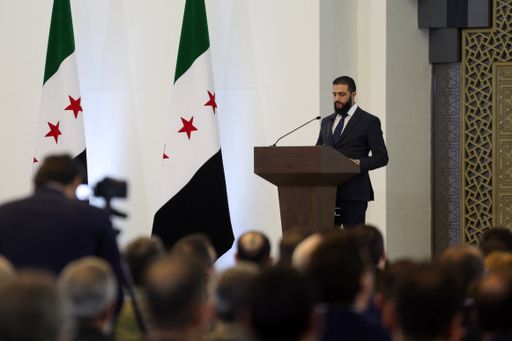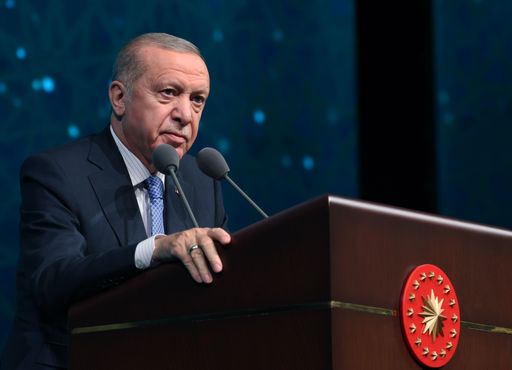Syria is emerging from more than a decade of civil war; its future remains deeply uncertain. Regional rivalries and foreign interventions continue to shape the country’s recovery.
Three dynamics stand out: Israel's repeated attacks and policies of disintegration, the international community's muted response, and Türkiye's emerging role as a potential guarantor of stability form the pieces of this complex puzzle.
This raises key questions. What is Israel’s true endgame in Syria? Why has the world remained largely silent after its intensified strikes following the Gaza war? Could Syria’s eventual inclusion in the Abraham Accords satisfy Israeli security concerns? And where should Türkiye place itself in this shifting environment?
Israel's endgame in Syria
The first dynamic is Israel’s campaign to keep Syria fragmented. In addition to the ongoing genocide in Gaza, Tel Aviv is also carrying out attacks and attempts of occupation against neighbouring countries.
After October 7, due to the security paranoia it entered, Israel has fallen into a cycle of uncontrolled and endless wars to re-establish its shattered deterrence. At the same time, this remains the only method in Prime Minister Benjamin Netanyahu's hands to keep the far-right government standing.
In the Syrian context, Israel acts as a continuation of its past policies. What it is trying to do in Syria is rooted in the principle known as the alliance of the periphery, which means cooperating with minorities and peripheral countries in order to weaken hostile Arab states in the region.
The political and military support given to the Druze groups led by Hikmat al-Hijri thus finds its logic within this framework.
The Druze are a small but significant Arabic-speaking minority in Syria, around a million strong and concentrated mainly in Suwaida near the Israeli and Jordanian borders.
In July, clashes broke out between Bedouin Arabs and Druze groups in the region. When Damascus deployed troops to restore order, Israel launched airstrikes on government forces, claiming to protect minorities from massacres. The incident revealed how Tel Aviv exploits local fault lines, particularly among the Druze, to obstruct Syria’s recentralisation.
This fits into a broader Israeli calculus. From Israel’s perspective, a stabilised Syria after Assad, resting on popular legitimacy, economic recovery, and restored territorial sovereignty, would be the worst-case scenario.
A strong Damascus could deny Israel the freedom to conduct cross-border raids, transfer arms to proxies at will, and manipulate substate actors.
Hence, Israel has instead sought to ensure that Syria remains a fragile state, dominated by internal rivalries, irregular militias, and foreign interventions.
This has manifested in Israeli support for Druze factions or endorsement of the PKK/YPG’s separatist efforts, as a way of eroding Syrian central authority.
Paradoxically, Netanyahu has often declared that Israel would not allow Syria to "become another Lebanon." Yet, in practice, Israeli policy pushes Syria toward precisely that Lebanese model of sectarian fragmentation by denying the Syrian army re-entry into southern territories, launching repeated airstrikes, and fostering conditions of military pluralism.
What particularly unsettles Israel is the prospect of Ankara’s rising role in Syria. During the civil war, Türkiye carried the heavy costs of hosting millions of refugees and stood as the principal supporter of then-Syrian opposition against the overthrown Assad regime.
Now, in the post-civil war environment, Ankara is repositioning itself. A potential Turkish-Syrian rapprochement, especially if paired with a US reduction of support for the PKK/YPG, could simultaneously reinforce Damascus’ sovereignty, expand Türkiye’s regional influence, and curtail Israel’s ability to act unilaterally across Syrian territory.
Thus, Israel's security discourse conceals what is in essence a strategy to maintain the luxury of unchecked intervention in neighbouring Arab states, a luxury threatened by Türkiye's growing influence.
The impossible task: Abraham Accords
By treating military force as its default tool, Tel Aviv risks locking Syria into a perpetual state of fragmentation and escalating the danger of a wider regional conflict. At the same time, the international community has largely normalised Israel’s violations of Syrian sovereignty.
Despite the presence of UN peacekeepers along the Syrian-Israeli Golan border under the 1974 disengagement agreement, Israel seized the opportunity in November 2024 to occupy the buffer zone.
In the nine months since, it has carried out a ground invasion and launched more than 500 airstrikes on Syrian territory. Although the UN Special Envoy for Syria condemned these actions, UN agencies have taken no concrete steps in response.
As a result, Israel’s attacks, consistent with its behaviour throughout the civil war, continue to go unanswered by the international community. Rather than challenging Tel Aviv’s aggressiveness, the international community, particularly the United States, has focused on reassuring Netanyahu that a stabilised Syria would not threaten Israeli security.
The logic is straightforward: if Damascus could be rehabilitated by including Syria to the Abraham Accords in a way that aligned with Gulf and US interests, it would cease to be a frontline actor against Israel, and normalisation would deepen.
Israel, however, diverges sharply from this vision. Rather than seeing Syria's reintegration as a guarantee of long-term security, Netanyahu's government prefers the luxury of unilateral strikes and interventions.
In Tel Aviv's calculus, a weak, fragmented Syria preserves Israel's regional dominance more effectively than a reconstructed state tethered to Türkiye and the Gulf.

Israel's preference for a divided and weak Syria can be attributed to its continued freedom to intervene in Syria, as well as its concern that a stable Syria could lead to the emergence of an anti-Israeli regime in the region.
Unlike the Assad regime, a government with the support of the majority of the population could, after achieving economic and political stability, take action against Israel's occupation and attacks on the occupied Golan Heights. Furthermore, in recent days, Netanyahu stated, "I'm not naïve, I know who I'm dealing with" regarding the Syrian government.
In short, for Washington, the priority is a ‘tamed’ Syria incorporated into a regional security order; for Tel Aviv, the priority is maintaining the ability to strike Syrian territory at will. The Abraham Accords, therefore, illustrate the impossible task of reconciling these divergent approaches.
Türkiye as a stabiliser and balancer
The past nine months have shown that, whereas Israel destabilises, Ankara could stabilise in Syria.
Türkiye's potential partnership with Damascus could represent a genuine path toward stability, including military cooperation to enhance the Syrian army's training, equipment, and conventional capabilities.
For the international community, the lesson is clear: engaging and supporting Türkiye in a constructive role, rather than ignoring Israeli aggression, may be the more effective path toward genuine de-escalation in Syria.
Türkiye, with its influence on the Syrian file and its pragmatic regional diplomacy, has shown the capacity to act as a counterweight and prevent escalation from tipping into uncontrollable conflict.
The Türkiye–Qatar partnership provides a valuable model. Just as the latter might, a Türkiye–Syria rapprochement could evolve into a joint mechanism to constrain Israeli aggression.
Every Israeli strike, paradoxically, pushes Damascus closer to Ankara, while simultaneously sharpening Turkish perceptions of the Israeli threat. The possibility of Turkish-Syrian military, economic, and political cooperation, especially if Washington reduces its support for the PKK/YPG, constitutes precisely the kind of regional alignment that Tel Aviv fears.
During the civil war, Türkiye successfully dealt with Russia, Iran, and non-state actors; in the new period, however, it now finds Israel as its primary rival. Just as Türkiye, through the Astana and Sochi negotiations, was able to create a ground for struggle with Russia and Iran despite being left alone by the United States, in this new phase, we may see a process in which Türkiye learns how to cope with and control Israel's aggressiveness.
As Türkiye's military operations provided living space for the Syrian opposition and cleared regions of terrorism, we are now faced with an equation where Türkiye must support stability and territorial integrity across all of Syria with its direct military presence.
This is significant not only in terms of contributing to Syria's stability and thereby to Türkiye's national security but also as a field of regional competition between Türkiye and Israel, strengthening Türkiye's deterrence against Israel. Therefore, on this old battleground, a new battle awaits Türkiye.
After more than a decade of civil war, both Damascus and Ankara are engaged in a long game.
For Syria, whose capabilities remain limited, this strategy is the only realistic path to restoring stability and territorial integrity. The long game is about buying time: breaking out of diplomatic isolation, attracting economic investment, facilitating the return of Syrians from abroad, and slowly rebuilding state authority.

Israel, however, is working to nip this recovery in the bud. A stable Syria, especially one supported by a growing Turkish presence, would directly challenge Israel’s ability to strike across borders, manipulate militias, and maintain the “luxury” of unchecked intervention.
Where Israel seeks perpetual fragility, Türkiye has the chance to build lasting stability, and that contest will define the region’s next chapter.




















